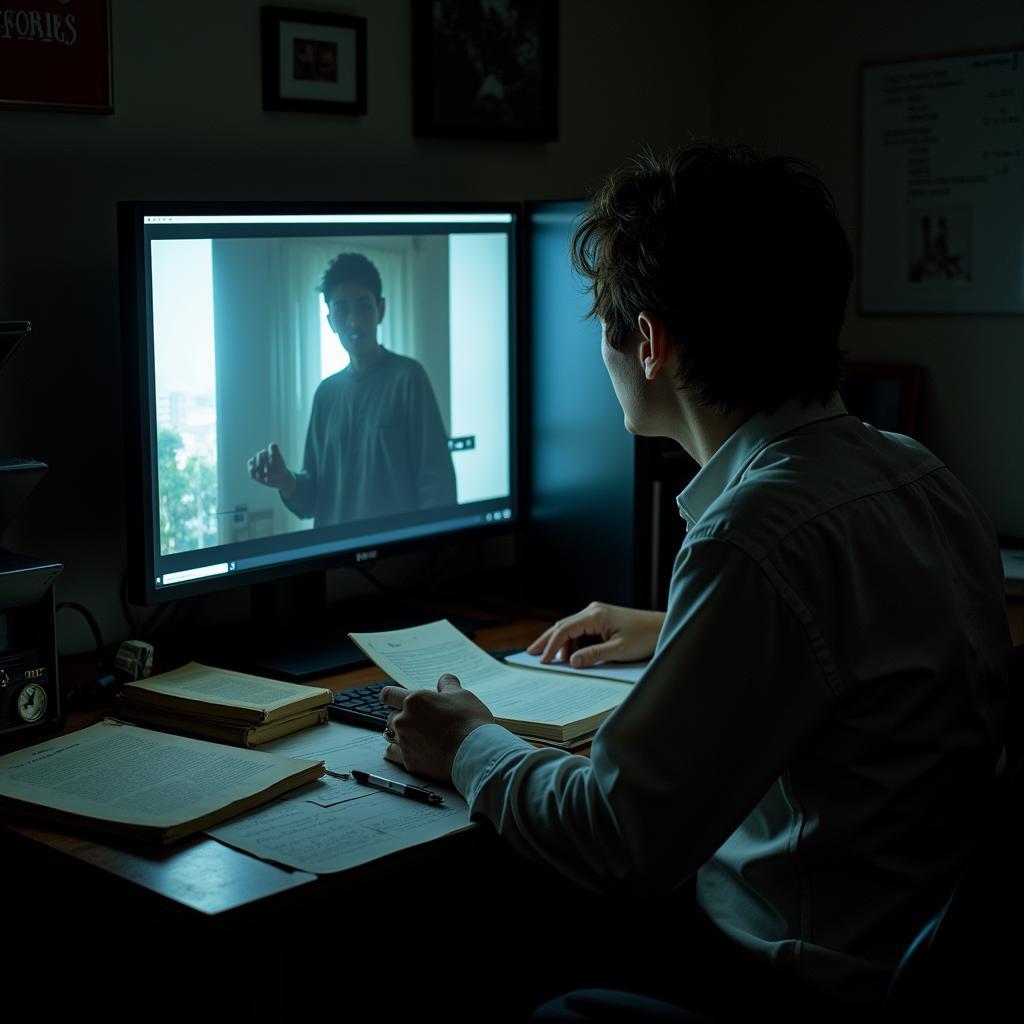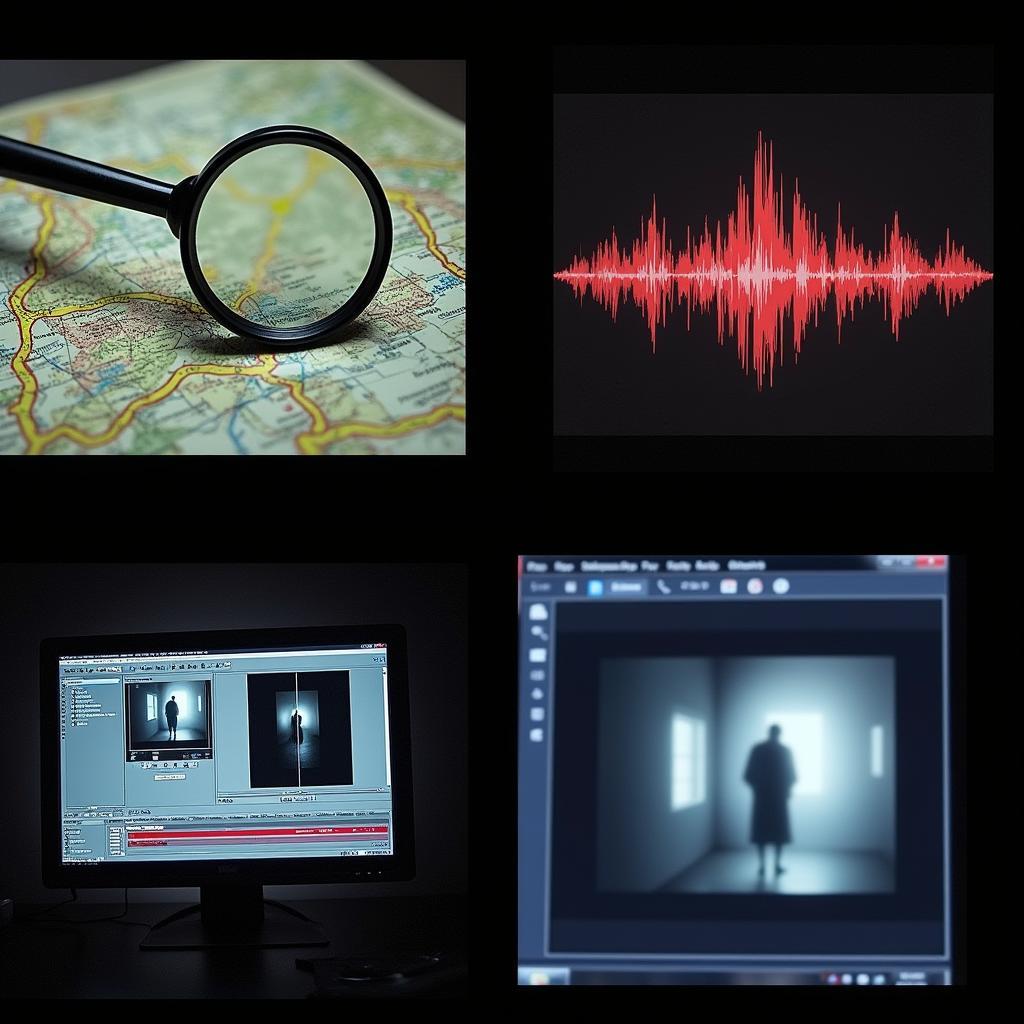The realm of the paranormal has always captivated the human imagination, driving us to seek answers beyond the veil of the known. In this quest for understanding, a Media Researcher plays a crucial role, meticulously sifting through a vast sea of information to uncover the truth behind unexplained phenomena.
 A media researcher analyzing paranormal footage
A media researcher analyzing paranormal footage
The Role of a Media Researcher in Paranormal Investigation
Media researchers in the paranormal field don’t don ghost-hunting gear or conduct séances. Their expertise lies in their analytical skills and ability to navigate the labyrinthine world of media, discerning fact from fiction. They are the archivists of the unexplained, meticulously collecting and analyzing data from a wide range of sources:
- Historical Archives: Unearthing old newspapers, journals, and official records for mentions of unexplained events or local legends.
- Audio-Visual Content: Analyzing photographs, audio recordings, and video footage for evidence of paranormal activity, often employing specialized software to enhance and examine details.
- Online Resources: Scouring online databases, forums, and social media for eyewitness accounts, historical data, and potential leads for further investigation.
 Essential tools and techniques of a paranormal media researcher
Essential tools and techniques of a paranormal media researcher
Essential Skills for Aspiring Paranormal Media Researchers
While a passion for the paranormal fuels the fire, a successful media researcher requires a specific set of skills:
- Critical Thinking: The ability to analyze information objectively, identifying biases, inconsistencies, and potential hoaxes is paramount.
- Research Proficiency: Mastering various research methodologies, both traditional and digital, is essential for uncovering hidden connections and verifying information.
- Technical Skills: Familiarity with audio and image editing software, as well as research databases, is crucial for analyzing and managing data effectively.
- Communication Skills: Presenting findings clearly and concisely, both in written reports and verbal presentations, is key to sharing knowledge and collaborating with others.
genealogy researcher jobs often require similar research skills, highlighting the transferable nature of this skillset.
The Importance of Ethics in Paranormal Media Research
The sensitive nature of paranormal research demands strict adherence to ethical guidelines. Media researchers must prioritize:
- Respect for Privacy: Obtaining consent before sharing personal information or media related to individuals involved in paranormal events is crucial.
- Data Integrity: Maintaining accurate records, avoiding manipulation of evidence, and presenting findings transparently is essential for maintaining credibility.
- Sensitivity: Approaching the subject matter with respect and understanding, particularly when dealing with potentially distressing or traumatic experiences, is paramount.
The Future of Paranormal Media Research
The digital age has ushered in a new era for paranormal media research. With the explosion of user-generated content and online platforms, the volume of data available for analysis is unprecedented. This presents both challenges and opportunities for researchers, requiring them to adapt their methods and leverage new technologies to stay ahead of the curve.
As technology evolves and our understanding of the universe expands, so too will the role of the media researcher in unraveling the mysteries of the paranormal.
Frequently Asked Questions about Media Research in the Paranormal
1. What is the difference between a paranormal investigator and a paranormal media researcher?
While both are interested in the paranormal, a paranormal investigator typically focuses on gathering evidence in the field, while a paranormal media researcher analyzes existing data and media to support investigations or uncover new leads.
2. Is formal education required to become a paranormal media researcher?
While a degree in journalism, history, or a related field can be beneficial, it’s not strictly required. Strong research skills, critical thinking, and a passion for the paranormal are equally valuable.
3. What are some common challenges faced by paranormal media researchers?
Dealing with misinformation, hoaxes, and the ethical considerations of handling sensitive data are some of the biggest challenges faced in this field.
4. How can I get involved in paranormal media research?
Joining online communities, volunteering with paranormal research groups, and developing your research skills are all great ways to get started.
5. What is the most rewarding aspect of being a paranormal media researcher?
The thrill of uncovering a hidden piece of history, potentially shedding light on unexplained phenomena, and contributing to our understanding of the unknown makes this field immensely rewarding.
Seeking Answers in the Digital Age
The role of a pro football researchers association might seem worlds apart from paranormal investigations, yet both require meticulous attention to detail and a passion for uncovering hidden truths. As we delve deeper into the digital age, the ability to navigate the vast ocean of information becomes increasingly crucial. If you possess a keen eye for detail, a thirst for knowledge, and the courage to explore the unknown, the world of paranormal media research might just hold the key to unlocking the mysteries that lie beyond our current understanding.
Remember, when it comes to the paranormal, the truth is often stranger than fiction. If you find yourself in need of assistance navigating the unexplained, our team at Paranormal Research is here to help. Contact us at 0904826292, email us at research@gmail.com, or visit us at No. 31, Alley 142/7, P. Phú Viên, Bồ Đề, Long Biên, Hà Nội, Việt Nam. Our dedicated team is available 24/7 to assist you on your journey into the unknown.